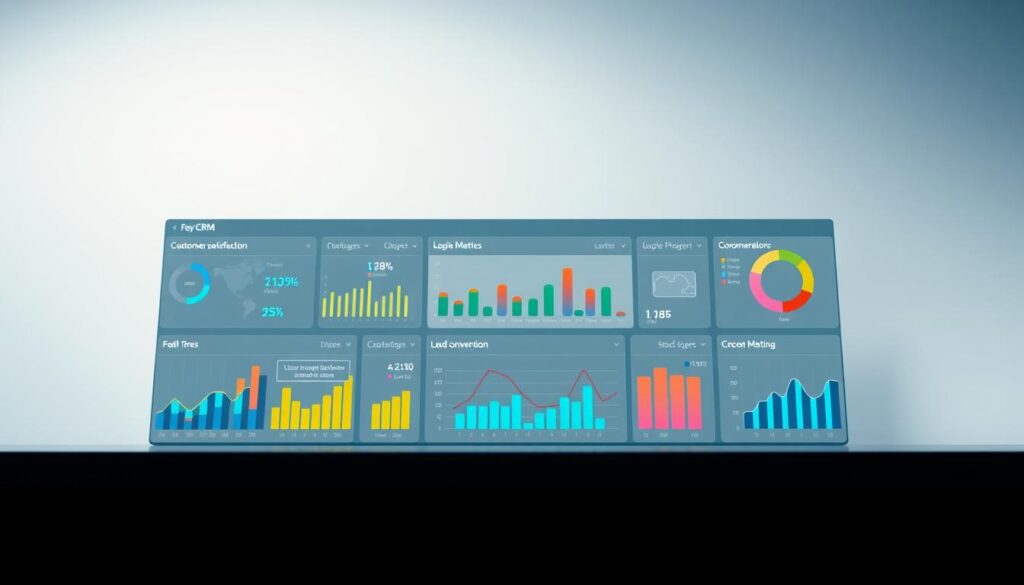Did you know that companies using CRM software see an average increase of 29% in sales?
This big jump is thanks to effective customer relationship management. It helps businesses build stronger ties with their clients. With automated CRM, companies can make their processes smoother, improve customer service, and grow.
CRM is all about managing interactions with customers to better business relationships. With automated customer relationship management, businesses can keep in touch with customers, make things simpler, and boost profits.
Key Takeaways
- CRM software can significantly boost sales.
- Automated CRM enhances customer experiences.
- Effective CRM streamlines business processes.
- CRM helps in building stronger customer connections.
- Businesses using CRM see improved profitability.
What is Automated Customer Relationship Management?
In today’s fast-paced business world, knowing about Automated Customer Relationship Management (CRM) is key to success. Automated CRM uses technology to manage and analyze customer interactions and data. It helps businesses streamline processes, improve customer service, and boost profits.
Definition and Overview
Automated CRM is a customer relationship management system that automates tasks like data entry and follow-up emails. It uses CRM technology to unify customer data across departments. This gives everyone the same information, improving collaboration and providing a full view of the customer.
CRM software is for all kinds of businesses. It helps large companies track customer activity and share it across departments. Small businesses can do more with less, and startups can be efficient and agile. By automating tasks, businesses can focus on building strong customer relationships.
Importance in Today’s Business Landscape
The role of Automated CRM in today’s business world is huge. It’s a key tool for providing personalized experiences. It lets companies analyze customer behavior and tailor their marketing efforts to improve satisfaction.
Also, Automated CRM keeps businesses competitive by offering real-time data and insights. This helps them quickly adapt to customer needs and market trends. In short, Automated CRM is more than technology; it’s a strategy for better customer engagement and business growth.
Key Features of Automated CRM Systems
CRM automation brings together different customer touchpoints into one system. This makes managing customer relationships easier for businesses. It integrates various functions to help manage customer interactions more efficiently.
Contact Management
Contact management is a core feature of automated CRM systems. It lets businesses store and manage customer info in one place. This makes it easy to access and update customer data.
With contact management, we can track customer interactions, preferences, and history. This helps in personalizing and improving communication with customers.
Sales Automation
Sales automation is a key part of automated CRM solutions. It automates routine sales tasks, freeing up sales teams to focus on important activities. This includes building relationships and closing deals.
Sales automation also helps with lead scoring, pipeline management, and forecasting. It makes the sales process more efficient and predictable.
Reporting and Analytics
Automated CRM systems offer strong reporting and analytics. They give businesses insights into customer behavior and sales performance. This helps in making informed decisions and optimizing strategies.
Reporting and analytics also help measure CRM automation’s effectiveness. They identify areas for improvement.
Email Integration
Email integration is a key feature of automated CRM solutions. It integrates email with CRM, allowing for targeted campaigns and tracking email interactions. This helps in nurturing leads and building stronger customer relationships.
| Feature | Description | Benefits |
|---|---|---|
| Contact Management | Centralized database for customer information | Efficient data management, personalized communication |
| Sales Automation | Automation of routine sales tasks | Increased sales productivity, improved forecasting |
| Reporting and Analytics | Insights into customer behavior and sales performance | Data-driven decision making, optimized strategies |
| Email Integration | Integration of email with CRM for targeted campaigns | Enhanced customer engagement, timely follow-ups |
Benefits of Implementing Automated CRM
Automated CRM helps businesses work better and connect with customers more effectively. It makes managing customer interactions easier. This is key for any business looking to improve.
Efficient Operations
Automated CRM boosts efficiency by handling routine tasks. This lets businesses focus on important work like sales and customer service. It makes them more productive and improves customer happiness.
CRM software cuts down on paperwork. It lets teams share information easily. This makes everyone’s job easier.
Better Customer Understanding
Automated CRM gives deeper insights into customers. It collects and analyzes data. This helps in making better marketing, improving service, and boosting satisfaction.
It helps businesses understand what customers want. This way, they can offer services that meet those needs.
Personalized Customer Interactions
Personalized communication is a big plus of automated CRM. It uses customer data to send messages that customers find relevant. This builds loyalty and engagement.
Personalization works through emails, social media, and phone calls. Automated CRM makes handling these easier.
| Benefits | Description | Impact |
|---|---|---|
| Increased Efficiency | Automation of routine tasks | Improved productivity and reduced administrative burden |
| Improved Customer Insights | Collection and analysis of customer data | Enhanced customer understanding and targeted marketing |
| Personalized Communication | Tailored messages and offers | Increased customer engagement and loyalty |
Choosing the Right Automated CRM Solution
Finding the right automated CRM solution is key for managing customer interactions well. As companies grow, their CRM needs get more complex. It’s vital to pick a CRM that fits their specific needs.
Factors to Consider
When looking at automated CRM solutions, several things matter. Scalability is important, as the CRM should grow with your business. Ease of use is also key, making sure your team can use it easily without a lot of training.
- Integration capabilities with existing business applications
- Customization options to meet specific business needs
- Mobile accessibility for on-the-go sales teams
- Robust security features to protect customer data
Popular CRM Platforms
Many CRM platforms are popular because they offer great features and flexibility. Modern CRM platforms let businesses add more features through third-party apps and integrations. This makes their CRM experience better.
Some top CRM platforms are:
- Salesforce
- HubSpot CRM
- Zoho CRM
- Microsoft Dynamics 365
Implementation Process
Implementing an automated CRM solution needs careful planning. Start with a detailed needs assessment, then choose the right CRM vendor. After that, move on to data migration and system integration.
Key steps in the implementation process include:
- Defining your CRM requirements and objectives
- Configuring the CRM system to meet your business needs
- Training your staff to ensure they are comfortable using the new system
- Monitoring and adjusting the CRM as necessary to optimize its performance
By thinking about these factors and following a structured plan, businesses can get the most out of their CRM. This leads to better customer relationships and more efficient operations.
How Automated CRM Enhances Customer Experience
Companies can greatly improve customer experience with CRM automation. It makes follow-ups easier, keeping communication with customers smooth and on time. This includes updates, reminders, or follow-ups on purchases.
Streamlined Interactions
Automated CRM systems make managing customer interactions better. They help sales teams spend more time on important tasks. This is because they don’t have to deal with manual data entry.
- Personalized communication
- Timely follow-ups
- Consistent customer engagement
Faster Response Times
In today’s fast world, quick responses are key. Automated CRM lets businesses answer customer questions fast. This boosts customer happiness.
Key benefits include:
- Reduced response time
- Improved customer satisfaction
- Increased efficiency
The Role of AI in Automated CRM
AI is changing Automated CRM systems, making customer experiences more personal. It helps companies understand what customers like and do. This way, they can offer better services.
Predictive Analytics
Predictive analytics is a big help from AI in CRM. It turns scattered data into detailed customer profiles. This lets businesses send messages that really speak to customers, suggest products they might like, and make content that fits their interests.
For example, predictive analytics spots trends in what customers buy and look at. It predicts what they might want next. This lets businesses reach out to customers with what they need, just when they need it.

Chatbots and Virtual Assistants
Chatbots and virtual assistants are key in AI for CRM. They answer questions, offer support, and even help with buying things, all by themselves. This makes customers happier because they get help fast.
Also, chatbots and virtual assistants can use CRM software to know more about customers. They can then give advice and solutions that fit each customer’s needs. For more on AI changing CRM, check out IBM’s insights on AI in CRM.
Using AI in Automated CRM helps businesses work better and make customers happier. As AI gets better, it will play an even bigger part in shaping CRM’s future.
Best Practices for Using Automated CRM
Using automated CRM well is key to managing customer relationships. By following these tips, businesses can get the most from their CRM. This ensures they make the most of their investment.
Regular Data Updates
Keeping customer data current is crucial. Old data can lead to bad decisions and lower CRM efficiency.
- Regularly clean and update customer databases to remove duplicates and outdated records.
- Implement data validation processes to ensure the accuracy of new data entries.
- Use automated tools to synchronize data across different platforms.
Training Your Team
Training your team well is also essential. Good training lets users use the CRM system’s features effectively.
- Develop a structured training program that covers all aspects of the CRM system.
- Provide ongoing support and resources to help team members overcome any challenges.
- Encourage feedback from users to identify areas for improvement in the training process.
By focusing on regular data updates and thorough team training, businesses can improve their use of automated CRM. This boosts customer relationship management and helps the business succeed.
Measuring Success: KPIs for Automated CRM
The real value of automated CRM is how it boosts customer relationships. This can be seen through different KPIs. To really know if automated CRM is working, businesses need to pick and track the right metrics.
Customer Satisfaction Scores
Customer satisfaction is key to CRM success. Customer Satisfaction Scores (CSAT) show if a company is meeting customer needs. By checking CSAT often, businesses can spot where to improve in customer service.
To figure out CSAT, companies use surveys or feedback forms. They ask customers how happy they are with their experience. This helps adjust CRM strategies to better engage customers.
Conversion Rates
Conversion rate is another important KPI for automated CRM. It shows how many leads turn into paying customers. Higher conversion rates mean the CRM is doing a good job of nurturing leads and making the sales process smoother. By looking at conversion rates, businesses can tweak their sales tactics and CRM to support the sales team better.
- Watch lead conversion rates to see how well CRM works in sales.
- Look at the sales pipeline to find and fix bottlenecks.
- Change CRM strategies based on conversion rate data to boost sales.
By focusing on these key indicators, businesses can make sure their automated CRM is working as it should. This helps keep improving customer relationships.

In summary, checking the success of automated CRM with KPIs like customer satisfaction scores and conversion rates is crucial. By keeping an eye on these metrics, companies can make smart choices to improve their CRM strategies.
Common Challenges in Automated CRM Adoption
Adopting automated CRM systems is complex. Businesses face many issues when trying to manage customers better. These problems can slow down the use of CRM software.
Resistance to Change
One big problem is when employees don’t want to change. They might be used to old ways and not like new tech. This can make it hard to use the CRM well.
To solve this, training and support are key. It helps employees see how CRM can make their work better. A culture that welcomes new ideas can also help.
Data Privacy Concerns
Data privacy is another big issue. CRM systems deal with personal info, so keeping it safe is crucial. Companies must protect this data and follow rules to keep customers’ trust.
Here are some ways to handle data privacy:
- Use strong encryption
- Do security checks often
- Follow data protection laws
By tackling these problems, businesses can find ways to succeed with CRM. This makes their CRM adoption better.
Future Trends in Automated Customer Relationship Management
Automated CRM solutions are key for business growth. It’s crucial to keep up with the latest trends in this field. The future of CRM will blend with other tech and focus on personalization. This will help businesses offer more customized experiences to their customers.
Emerging Technologies
CRM automation will soon merge with AI and machine learning. This will give businesses a deeper look into what customers like and want. It will lead to smarter CRM strategies.
Personalization at Scale
Personalization is becoming a big deal in automated CRM. Businesses will use data and analytics to make experiences that really speak to customers. This will boost engagement and loyalty. We’ll see even more advanced CRM solutions that make personalization easier and more effective.



